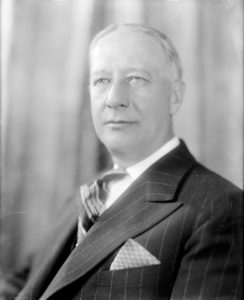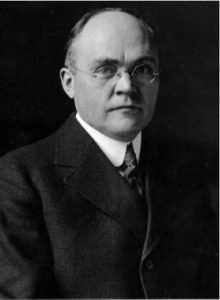Why Does New York State Have Municipal Historians?
by Karen Osburn, City of Geneva Historian

Governor Al Smith
In 1919 New York State became the only state to require every municipality to appoint a public historian. On April 11, 1919 Governor Al Smith signed Law 57.07, often called the “Historians Law.” This law mandated the position be filled by each town, village or city, but did not require the historian be paid. It was left to the municipalities whether or not to pay the person. New York State has over 1600 municipalities within its boundaries and, while not every position is filled, the majority have a historian.
In my discussions with various historians I find many are unpaid, do not have an office, work out of their home, and may or may not have a budget for supplies. (For the record, the City of Geneva does not pay their historian, and any people offering items or collections to the historian are directed to donate them to the Geneva Historical Society).
Why did the state legislature pass this law? Many events of a historic nature were happening around 1919, though not all of them were in our state. Some were national like the 18th and 19th amendments for prohibition and women suffrage, the “Red Summer” 1919 (so called because the blood of hundreds of African Americans was spilled when they were burned alive, lynched, shot or beaten) or the Great Flu Epidemic. Some events were of a local nature such as the Great Molasses Flood of 1919 (often referred to by locals as the Boston Molassacre) when a huge tank belonging to Purity Distilling in Boston’s North End burst drowning the residents of the area in 2.3 million gallons of the sweet, sticky syrup. When the disaster was over 21 people had died and 150 were injured. Our state wanted to be certain local reactions and interactions with these events were saved for future generations.

James Sullivan
However, the main reason was U.S. participation in WW I, which ended in November 1918. Having learned a lesson after the end of the Civil War, when few records other than troop rosters were kept, New York State was determined the same fate would not happen to records and artifacts from the “Great War.” New York State Historian, James Sullivan, wanted to make sure that local records of this war and its impact on the people of New York State were kept and preserved. One way to encourage saving of records was to require historians, whose first duty after the law was passed, to collect materials documenting their community’s role in the war and send copies to the State Historian.
Another reason, as one of the original 13 colonies, New York State has a long and rich past that could be used to boost interest when marketing the state to tourism and business interests.
What are some of the duties of a municipal historian? There is some disagreement on that, depending on who you talk with, but essentially an appointed public historian in New York State is responsible for doing research and writing about their findings, teaching and/or doing presentations for the public, helping with historic preservation, promoting tourism, and helping a city or town and individuals with research on various topics. A municipal historian should serve all constituents of their area without regard to partisan politics. They are not supposed to be records managers, genealogists for hire, or antiquarians.
The Association of Public Historians of New York State (APHYNS) represents all the government employees in the state, while another organization called Government Appointed Historians of Western New York (GAHWNY) additionally represents historians in western New York. APHNYS has a registered historian program and offers training sessions for new historians offering advice on best practices for the newly appointed person.
In Geneva we are very fortunate to have a city that believes in appointing a historian and we also have an active, professionally staffed historical society. Working together they insure that the history of this area is preserved for future generations of Genevans.

ENJOYED the information.
Very informative article. It certainly clears dup some confusion across NYS.
Maureen Doyle
President
Jordan Historical Society, a privately owned not for profit organization.
Jordan, NY. 13080